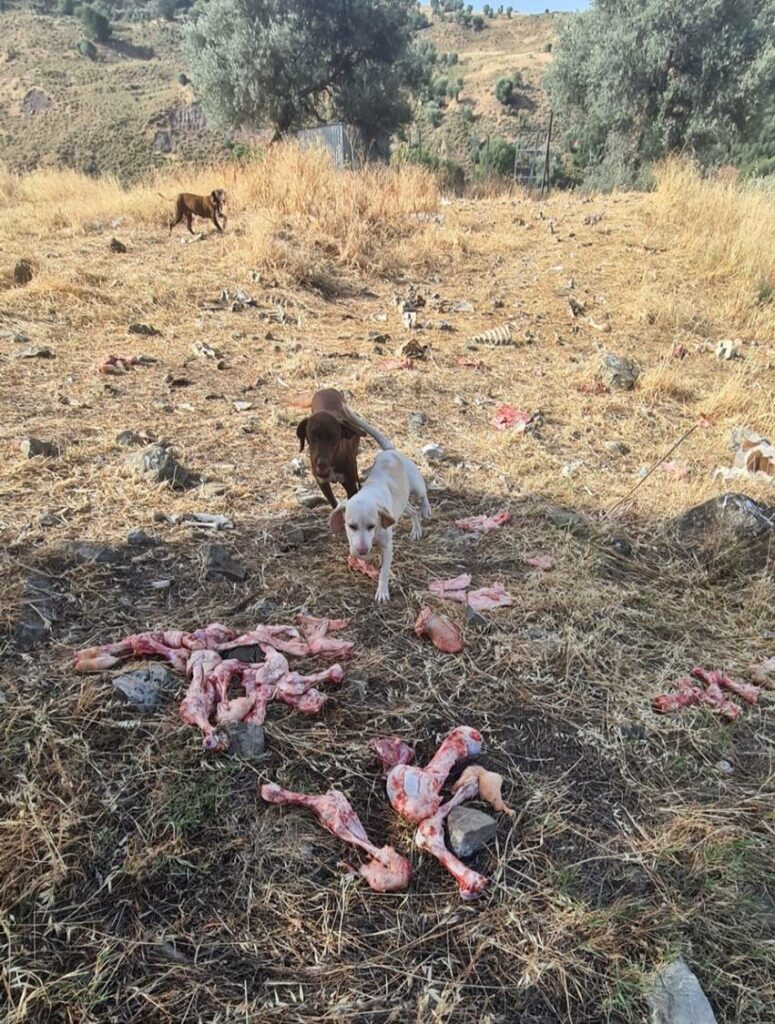Filenews 6 July 2024 - by Angelos Nicolaou
Unacceptable, controversial and unorthodox methods are used by hunting dog trainers in their livestock training facilities up to the installation of cages in the countryside for illegal training purposes, not only on private plots, but also on gravel, Turkish Cypriot, forest land, etc.
In these cases, dogs are not microchipped, to avoid a fine. In most cases, they live under appalling conditions and their diet consists almost exclusively of butcher waste, such as raw bones and pieces of fat. As a result, outbreaks of infection are caused for both human health and dogs.
The problem is real and extremely worrying and occurs throughout Cyprus, since no checks are carried out on premises that are breeding farms. To date, most people are unaware of the existence of these incidents, but the competent authorities receive complaints throughout the Republic. Many complaints about damage are also made by communities, livestock breeders, nature lovers with negative effects on the fauna. There is therefore an urgent need to find a solution to the problem, which is concerned about its increasing trend.

In fact, as long as there is the uncontrolled breeding of dogs in these areas and there is no control over their signage, the problem with stray dogs, overcrowded shelters, their miserable living conditions, the spread of viral infections and other infectious diseases and many other problems will intensify. Tacit tolerance and failure to implement the legislation exacerbate the problem and a solution is urgently needed. It is now considered necessary to mark hunting dogs.
And while all this is happening, on the basis of the obligations of the competent authorities as they arise from the "Dog Management Law", the preparation of a plan for the capture and management of stray dogs is required.

The reasons for the increase of the problem as recorded by the competent services are the non-implementation of dog tagging and the management by the local Authority. They indicate that there is no control in premises that are breeding farms and highlight the issue of dog abandonment by hunters. It is characteristic that the majority of strays are from hunting breeds.
Therefore, for hunting activities it is necessary to sign for all dogs, both for hunting trips and for educational ones. 40,142 dogs are registered in the Game and Fauna Service's electronic system.
According to the data of the Game Service, in 2023 372 extrajudicial notices were issued concerning the control of hunting dogs. Specifically, 109 concerned the number of dogs in training, 22 concerned exercising dogs without a license, 85 concerned unmarked dogs, three concerned dog movement at night, eight concerned dogs in prohibited hunting areas, one hunt accompanied by dogs without a license and 144 out-of-court complaints about dog training areas.

The Game and Fauna Service speaks of incalculable impacts on wildlife, since this practice is applied all over Cyprus, including important habitats and protected sensitive areas. In the district of Pafos, the Game Service carried out a mapping of premises with dogs where illegal training takes place. The data show that there is a real problem in all areas, while there is an increasing trend over time. In the district of Pafos alone, 70 establishments have been identified, while it is considered certain that there are several other premises that are difficult to locate.
They call for tougher penalties and protection of the breeding season
One of the hottest potatoes that the Cyprus Federation of Hunting and Wildlife Conservation (KOK & DAZ) has to manage, its president Elias Pekris described the chapter of hunting dogs. It is necessary, he noted, to protect at all costs the breeding season of all species, March, April, May and, according to the Game and Fauna Service, June as well. At that time, he added, no permits should be given for training, only for the exercise of dogs. According to Mr. Pekris, apart from hunting, KOK&DAZ has an obligation to protect the country's fauna. He pointed out that he has hinted to the MPA for harsher penalties for offenders, as well as more controls.
Tasos Sialis, BirdLife Cyprus' campaign coordinator, said it was important to ban the training of hunting dogs during the nesting season, from March to August. It is a big mistake, he said, not to prohibit disturbance to nesting birds. He also mischaracterized the fact that year by year the areas of exercise of hunting dogs are increasing. He added that this is a big issue that needs to be resolved by the competent authority, while expressing BirdLife Cyprus' concern that many pressures from the opposite side are gaining ground, while raising the issue of controlling activity. As a large-scale activity, he said, it should be examined whether it can affect Natura 2000 sites and for this reason the MPA should prepare a study and examine it. According to Mr. Sialis, hunting dogs are allowed in Natura 2000 areas, such as Akamas and the Troodos forest, stressing that the MPA must finally see the issue in its entirety and stop giving permits at least to Natura 2000 sites.
